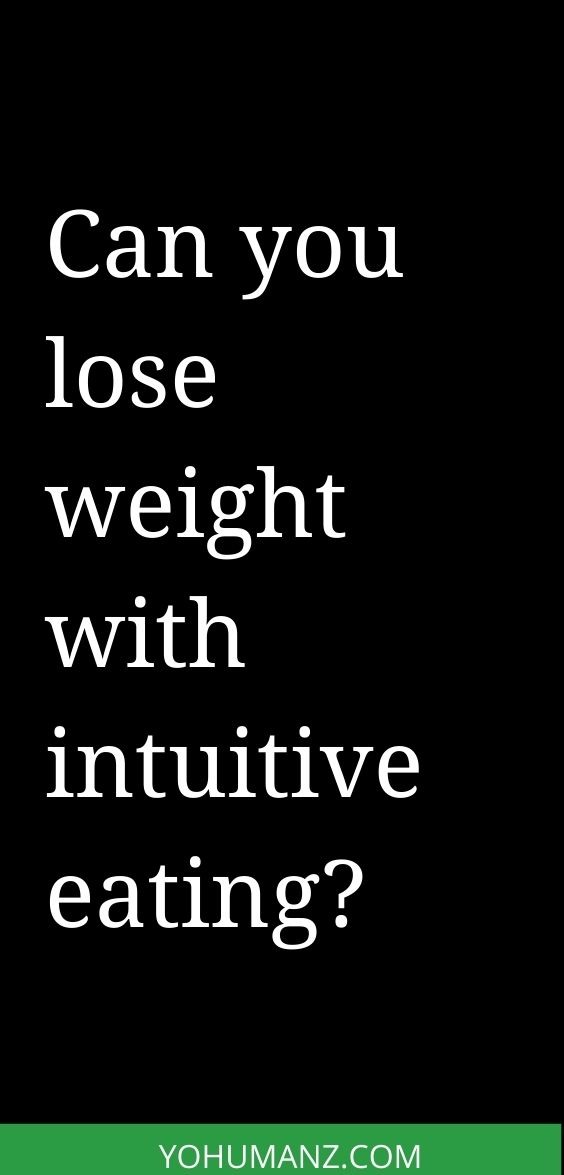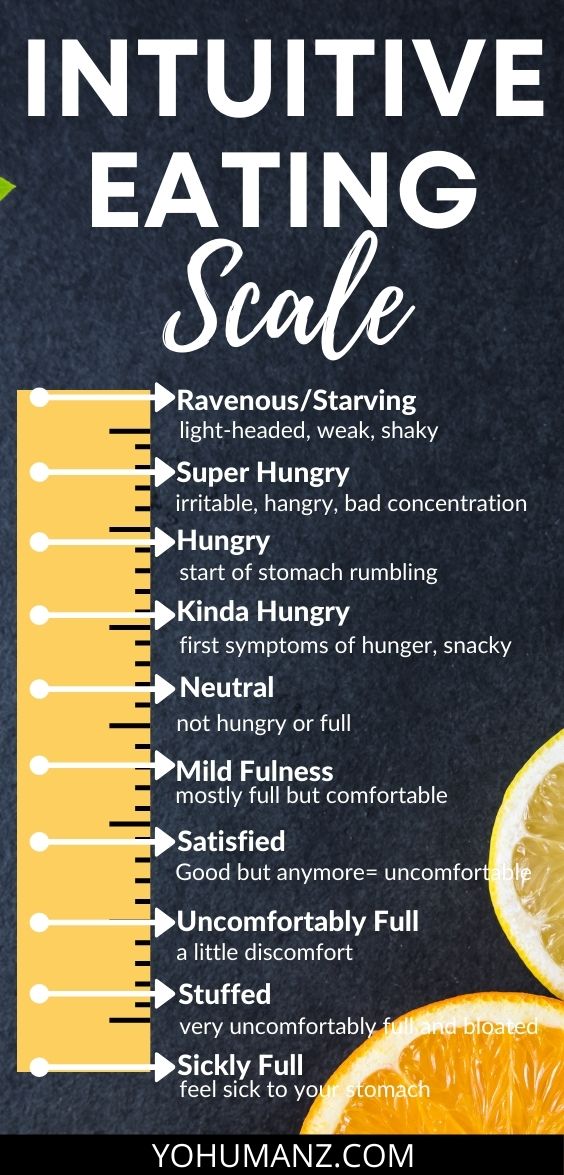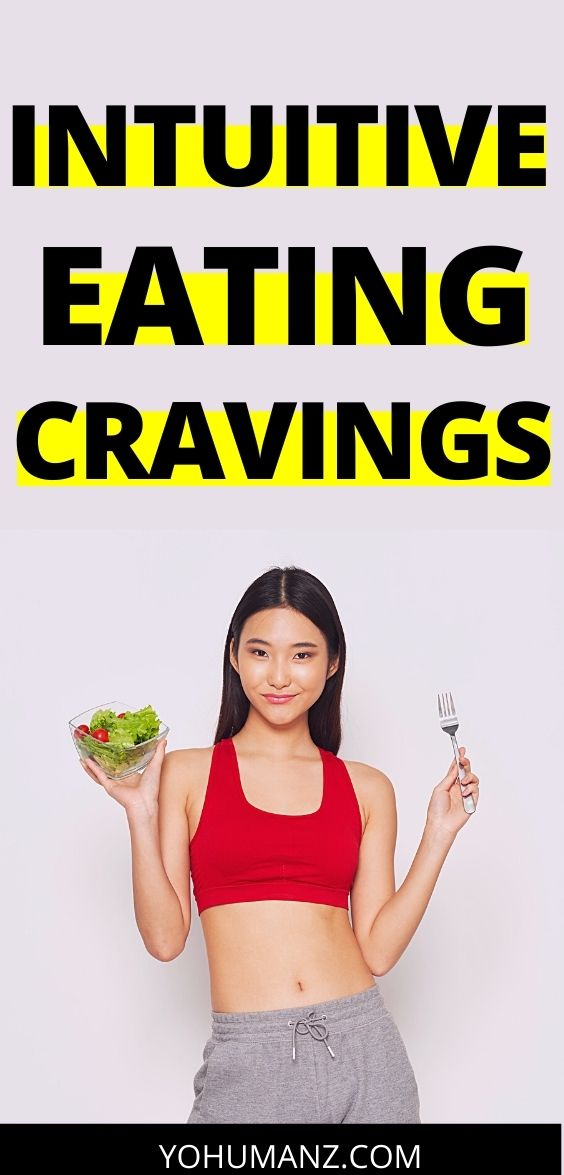Table of Contents
Can we stop marketing intuitive eating as a weight loss strategy?
I mean, it can lead to weight loss. But it can also lead to weight gain. Or just maintaining your size. And all of that is completely okay.
When people are looking into dieting plans, they might become curious whether losing weight with intuitive eating is possible. If you’re told you can eat whatever you want, how would it work?
Plus, how do cravings work? Can you eat an unlimited amount of anything?
The truth is that the answer isn’t clear-cut to any of these questions. Intuitive eating isn’t a diet. There aren’t strict rules. But it can help you achieve a healthy weight ideal for your specific body.
What is Intuitive Eating?
Intuitive eating is a habit of eating that honors your body’s instructs. Instead of following a diet plan or sticking to a strict set of rules, you listen and rely heavily on your body’s cues. To oversimplify it, when you’re hungry, you eat. When you’re not hungry, you don’t eat.
This sounds obvious but most of us don’t follow what our body wants. We eat when we’re stressed or sad, not when our body needs nourishment. Or, we might wait until we’re super hungry and could eat an entire house (and often do). We might restrict ourselves from certain foods. Instead of eating a bit of cake, we pretend our new favorite snack is carrot sticks.
Intuitive eating is the opposite of diet culture. Actually, it throws the idea of dieting on its head. Research has shown that despite our best efforts, diets don’t actually work.
So, how do you know what to eat? Intuitive eating helps you make decisions that are right for your body at that moment. It teaches you to value health and how you feel overlooking stick-thin. The idea is that when you follow your body’s cues, you will achieve the healthiest weight for you. This can include losing weight with intuitive eating or gaining it if you’re currently underweight. The phrase “intuitive eating” was coined in a 1995 book by the same name. It was written by two dieticians, whose concept has become more widely known.
Losing Weight With Intuitive Eating

Losing weight with intuitive eating is possible. But that doesn’t happen for everyone. It’s also not exactly the goal of intuitive eating.
How your weight changes with mindful eating depends on two factors:
- How often you head to your body’s cues
- Your “healthy” weight according to your natural body
By “healthy” weight, we’re referring to the most natural, healthy weight for your body. For example, if your goal is to be a size 0, if that’s not healthy for your frame or body, it won’t occur with intuitive eating. Instead, it can help you lose a healthy amount of weight or maintain your current weight.
If your goal is unhealthy or unrealistic, it won’t be accomplished with intuitive eating. At first glance, this might be a bummer. But you should also consider that every other diet will fail too. You might lose a lot of weight quickly with diets. Since it’s unsustainable though, you’ll gain it all back once the diet ends.
Intuitive eating lets us start to see our bodies in a new light. There’s no emphasis put on “looking” a certain way. All the focus is on how you feel. How’s your energy levels? How do you feel when you eat this vs. that?
It also helps us address the reasons we might be overeating. If we eat the whole bag of chips and later discover we weren’t even hungry, we don’t need to shame ourselves as diet culture does. Instead, we ask ourselves why? What emotional need were we trying to fulfill? How might we better fulfill it, properly, without food?
According to one of the dieticians who coined the term, nobody can rightfully tell you that you’ll lose weight with intuitive eating. She explains that focusing on an external goal, like weight loss, isn’t sustainable and impedes the intuitive eating process. She goes as far to say that if an ‘expert’ is coaching you to lose weight with intuitive eating, you should run.
If intuitive eating triggers body image issues or worries that the “healthy” size isn’t thin enough, you can also consider talking to a therapist.
Studies on Losing Weight With Intuitive Eating
As we discussed, losing weight isn’t a guarantee with intuitive eating. And that’s exactly what the research has shown.
When it comes down to it, how will you lose weight quicker: eating significantly less or being an intuitive eater? The former will obviously make you shed the pounds. It’s scientific fact. To illustrate this, one study compared those who followed intuitive eating versus those who used calorie restriction. Those who restricted calories lost significantly more weight.
Sounds great right? The problem is that eating that strict isn’t healthy and you won’t sustain it long-term, meaning that you’ll eventually gain back the weight. Over time, going through this cycle and do damage emotionally and could hurt your body too.
A 2012 study concluded that intuitive eating might be a healthier and more innate alternative to current dieting strategies for weight loss.
Another study looked specifically at new mothers trying to lose weight. They found that an intuitive eating approach may allow them to lose weight without weighing, measuring, recording and assessing their diet. For busy new moms, something lower effort could be a better alterative, they theorized.
More research has found that intuitive eating combined with mindfulness is more effective than traditional weight-loss programs.
There’s something else to consider that may benefit people trying to lose weight: Mindset shifts. Traditional approaches are based on how you look and appear to others. In other words, they’re extrinsically motivational.
In contrast, research shows that intuitive eating works on intrinsic motivation. This transition can be more effective.
For example, research shows that people who are internally motivated to workout are more likely to enjoy it and less likely to have restrictive eating patterns. This is compared to those who use external motivation or “guilt” as motivation. This group was more likely to have emotional eating patterns. Intuitive eaters also had a lower BMI in this study.
So, is losing weight with intuitive eating possible? Yes, it is. But it’s not a guarantee and not the goal. Instead, you’re encouraged to have internal reasons for following your body’s cues.
Intuitive Eating Hunger Scales

Before we discuss intuitive eating cravings, you should know about a guideline you can use. The intuitive eating hunger scale helps you evaluate how hungry you. This helps you determine whether you want to eat because of physical or emotional hunger.
For more tips on how to use this reference, read Intuitive Eating Hunger Scale Guide.
5 Ways to “Deal” with Intuitive Eating Cravings

Any diet includes cravings and so does intuitive eating. The difference is that as an intuitive eater, you deal with cravings a lot differently.
It’s a truly judgement-free zone. In this space, we pick apart cravings a little more. We try to investigate them to find the cause. When we find the cause, we can come up with good solutions.
Of course, sometimes no solution is better than a slice of cake. So if you have it, intuitive eating encourages you not to shame yourself. In fact, enjoy it. Every. Single. Bite.
As you might tell, there’s no true rules when it comes to dealing with intuitive eating cravings. But there’s some general principles to help guide you.
#1 Indulge
Cravings in diets are meant to be suppressed. If you want a “bad” food, you need to find a way to get rid of that urge. A common diet “trick” is to replace the “bad” food with something “good.” Instead of reaching for chips, eat a carrot.
Intuitive eating doesn’t label foods as “good” or “bad.” It’s all just… food. The way each food impacts your body is specific to you and something you’ll probably come to notice overtime. However, none are morally off-limits. For that reason, you’re free to have what you want. If you want chocolate, have it. Chips? Have some.
Intuitive eating wants you to fully enjoy the experience of that food. So the trick here is to really indulge in whatever you’re eating. Don’t eat and work, eat and text or eat and watch TV. Don’t do it mindlessly, make yourself present for each bite. Pay attention to the flavor and textures.
As you’re doing this, use your intuitive eating hunger scale to gauge how your hunger level is changing. This should let you know when to back off the food. At this point, you’ll notice it’s getting less enjoyable by bite.
While “giving into” cravings can sound scary for former dieters, when you pay attention to your body, it will begin to tell you how much is good for you. Maybe a few bites of cake is enough sweetness to fulfill your sweet tooth. Being fully present with food may lower how much you eat it because it makes you feel satisfied with the experience sooner.
#2 Pinpoint Trigger
When you have a craving for something, it’s a good idea to reference the intuitive eating hunger scale. Let’s say you realize that you’re not actually hungry but you still really want that food.
The next step is to try to frill down why. What emotional need are you trying to fulfill with food?
The thing with intuitive eating is that it goes beyond the body; it dives into the mind too. Since the way we eat has become so linked with our psychology, it’s a necessary pairing for many people.
In the original intuitive eating principles, #7 is “Cope with Your Emotions with Kindness.”
As you might feel, stuffing your face with food to number your emotions isn’t exactly kindness. Telling your emotions to disappear without acknowledging them isn’t self-compassion. However, neither is restricting yourself from foods.
What’s causing the trigger, if not your hunger? Examples include:
- Boredom
- Loneliness
- Sadness or depression
- Stress or anxiety
- Procrastination from doing something else
Once you’ve pinpointed the main cause, read the next tip
#3 Find Solutions for Emotions
Remember that if you actually are hungry, you should eat. But if you’re not and you’re craving to fill a void, pinpoint the trigger as suggested above.
Once you know what’s caused the craving, you can begin to brainstorm other things to solve it.
If you’re bored and reach for chips out of habit, think about other hobbies that will keep your hands busy. For example, knitting or beading could give you something else to do.
Often, the trigger is more emotional. Stressful days can have us wanting to say screw it with intuitive eating. It can also make you feel a little more numb if you’re depressed. Still though, none of these problems long-term are made better by eating. What will? If you’re stressed, look for healthy coping mechanisms. If you’re anxious, depressed or are having trouble finding ways to handle life, talk to a therapist. If one isn’t available, research coping mechanisms for your specific feeling/concern.
#4 Find Comfort
If you want to eat when you’re not hungry and it’s a habit, developing coping skills and methods is the long-term solution.
While you’re doing that though, there’s a “Band-Aid” solution that doesn’t involve food: Comfort.
Many times, when we’re reaching for food and it’s not because of hunger, it’s because we need soothing. We need some sort of sensory vacation from what we’re feeling. What else can trigger our sensations in a soothing, pleasing way? What will make us feel comforted? What’s something kind you can do for yourself at that moment?
The warmth of a bath or heating pad can provide a “mother’s love” type of comfort that supersedes any baked good. A cuddle with a dog or your partner can make you feel connected to your body again. Watching a funny TikTok video can give you relief in a demanding workday without reaching running to the vending machine.
The key is to not make this into a “diet hacks” thing. We’re not finding food alternatives and losing weight with intuitive eating. We’re just trying to be kind to ourselves. We’re trying to be specific with the nurturing we need.
We comfort ourselves with things besides food because it works better. Not because it will help us lose weight.
#5 Don’t Beat Yourself Up
Intuitive eating encourages you to recognize hunger cues. If you’re not hungry, you should look at why you want to eat anyway. This is the most healthy way to deal with a non-hunger-derived craving.
Yet, we’re human beings. We don’t always do what’s “best” for us. Sometimes, we know we aren’t hungry, but we’ll eat anyways. We know that it’s better to look to other alternatives for emotional soothing, but we still eat the whole cake.
Maybe our in judgment turned into a flat-out binge and now we’re uncomfortable and full. We feel like intuitive eating “failed us”. Or that we failed it.
This is normal. It’s life. It happens.
Take a deep breath. Unlike your diet, intuitive eating isn’t going to club you over the head for “giving into” that donut. Actually, it would prefer if you didn’t even use the phrase “giving in.”
Take away the shame and guilt. You can deal with your cravings better another time. Nobody is perfect.
Summary: Losing Weight With Intuitive Eating Cravings
losing weight with intuitive eating may be a side effect of the lifestyle, but it’s not a goal. The aim of intuitive or mindful eating is to listen to your body’s cues. Instead of focusing on external factors, we respect our body and pay attention to how it makes us feel. No foods are off-limits, but we’re encouraged to recognize emotional versus hunger eating.
In this process, the idea is that our bodies will reach their ideal healthy weight. This could mean weight loss or gain or maintaining how you are today. It all depends on your body and what’s healthy for it.
For that reason, nobody should say that you losing weight with intuitive eating is a guarantee. If you’re using the practice properly, weight loss shouldn’t be goal in the forefront anyway. Although it may be “goal” for health reasons, you’re encouraged to focus more on how internal motivators.
When we do this, we can address cravings in a healthy way. If we’re hungry, we eat the food we’re hungry for until we’re full. If we’re not hungry and we want to eat, we look into other ways to fulfill out emotional hunger. If we eat anyway, even when we’re not physically hungry, we don’t beat ourselves up over it.


